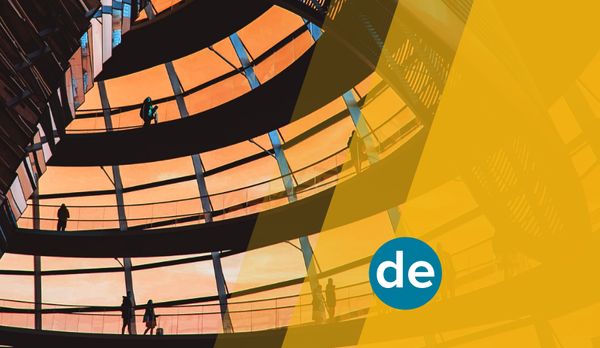More multi-stakeholderism, more creative drive: Germany is re-shifting its digital diplomacy approach to new priorities. An analysis.
It took a whole series of consultations involving over a hundred stakeholders – including DENIC – until Germany’s government officially delivered on its promise to fulfil a major milestone, on February 7: With its first Strategy for International Digital Policy presented by the Federal Ministry for Digital and Transport, the government has reached an ambitious stage goal, implementing a key objective in pursuit of Germany's Digital Strategy, which was launched in August 2022. A framework mapping out and underpinning the federal government’s future digital policy efforts beyond German borders, that dovetail with and tie into the previously adopted Cybersecurity Strategy for Germany (from August 2021, available in German only) as well as the National Security Strategy for Germany (from June 2023).
Along these lines, the new mission is to abandon Germany's previous marked reticence on the international digital stage in favour of a policy of a clear edge when it comes to working together with worldwide partners to protect the open, free and secure Internet and against its political appropriation through censorship or blocking – this is how Federal Digital Minister Volker Wissing summed it up in a press statement following the cabinet's decision on the strategy.
Overcoming Yesterday’s Restraint – Moving Towards Firm Attitudes and Dedication
International digital policy is now considered a "strategic field of action for safeguarding our interests and promoting our values", says the German government's strategy paper. An essential insight that has long been overdue: While in an ever more challenging geopolitical environment, digital technologies have an increasingly political impact, Germany and Europe simply can no longer afford to remain on the sidelines, but are called upon to play an active role in shaping the international digital space of the present and future. Therefore, the new vision is a global digital order that is based on human-centred and innovation-friendly rules, this way promoting democracy and freedom as well as prosperity, sustainability and resilience.
In close coordination with the other EU Member States and the European Commission, the German government aims to advocate for these principles more strongly than in the past and to strengthen its engagement in all relevant intergovernmental bodies, including but not limited to the G7 and the Group of Twenty (G20), the Organisation for Economic Cooperation and Development (OECD), the Council of Europe, the World Trade Organization (WTO), the World Bank and the United Nations (UN).
Moreover, the government continues to reject a purely multilateral approach to addressing digital policy issues and is very clear about fully endorsing the management of technical Internet resources by the multi-stakeholder community within ICANN (Internet Corporation for Assigned Names and Numbers) as well as supporting the United Nations' Internet Governance Forum (IGF) and its inclusive approach of broad digital participation.
What strikes a new note, on the other hand, is the aspiration and the commitment of German policymakers to specifically promote the participation of German stakeholders in international technical standardisation processes in the field of digital technologies. Standing up for standards to continue to follow neutral rules, this way putting a stop for them to be manipulated for political ends is a stance that had not been taken by a German government so far.
What Will Matter Now: Let Actions Speak
According to the leading Federal Ministry for Digital and Transport, the new strategy puts in place a long-term compass for an active and coherent shaping of Germany's global digital policy, that forms both the prelude to and the foundation of an ongoing process in which each government department will actively pursue its implementation. But what does this mean in concrete terms?
The first step was announced to be the short-term creation of a dedicated observer position for international digital policy issues at the highest political level, within the Permanent Mission of Germany to the United Nations in New York. This is where in mid-February started the consultations on the Global Digital Compact – a UN initiative in the run-up to its Future Summit in December 2024, which could call into question the multi-stakeholder model of Internet governance that has been tried and tested for decades.
The German government also strives for another attempt to secure a leading position within the International Telecommunication Union (ITU): ITU is a specialized agency of the United Nations and the only organisation under international law that is officially entrusted with coordinating technical aspects of telecommunications at a global level. To-date, it has never fully ceased to claim its own powers over domain names and IP numbers instead of having to leave them to the non-state Internet managers of ICANN, as is currently the case.
Together with its approach to obtain greater influence in the established multilateral bodies, another focus of the federal government’s strategy to back the free, open and secure Internet shall be to further enhance its ongoing value-based technology partnerships with democratic and like-minded partner countries, especially in the Global South. In the 2024 federal budget, funds earmarked for the broader involvement of international civil society in the government’s bilateral digital dialogues were raised to three million euros, thus doubling previous funds available for the mutual exchange and reciprocal capacity building in developing suitable framework conditions for the digital transformation, at an international level.
Paradigm Shift in Germany's Global Digital Policy:
The Most Important Commitments from DENIC's Point of View
The federal government’s new strategy for international digital policy is the result of an inclusive development process that embraced several rounds of consultation throughout 2023. As a key player of the technical community in Germany, DENIC not only closely followed the government's open dialogue formats, but was also actively involved as a stakeholder, together with more than a hundred civil society initiatives, research institutes, industry representatives and digital associations.
Of course, DENIC very much welcomes and supports all overarching goals laid down In the government’s policy framework, such as bridging the digital divide and promoting the protection of fundamental and human rights online, as well as shaping digitisation in a globally sustainable way and using its potential to effectively tackle global challenges faced, for example, as a result of climate change.
What we consider a particular success, however, as well as a payoff for our continued engagement, is that the German government has adopted and propagates a number of key principles in its strategy, that have always been of special importance to the technical community and include the commitment to
(1)
advocate for a global, open, free and secure Internet and for its principles to be enshrined in multilateral agreements and regulations;
(2)
support the integrity, confidentiality and availability of information and telecommunication systems that enable the secure use of digital technologies by all users;
(3)
propagate democratic values and the multi-stakeholder governance model as well as promote multi-stakeholder formats for the development of universal principles and rules for the digital space, including technical norms and standards;
(4)
advocate for the central role and future-proof development of established institutions of technical Internet governance, in particular the management of Internet resources through ICANN as well as the further development of the Internet through the IETF (Internet Engineering Task Force);
(5)
support – at national and international levels – the development and security of open source basic technologies as important technical elements of the global Internet and foundation of digital sovereignty.
Conclusion
By virtue of its own organisational structure as a cooperative, DENIC keeps adhering to the principle of democratic participation and therefore is always a strong supporter of broad stakeholder involvement, including in the digital policy sphere.
At domestic level, there have recently been promising advances by policymakers to keep up-to-date local stakeholder groups including civil society, academia, the private sector and the technical community on ongoing developments and to involve them more closely in planning and implementation processes: This becomes evident, in general, through the increased involvement of the Federal Government within Germany’s national Internet Governance Forum (IGF-D, website available in German only), but more specifically through the series of national multi-stakeholder dialogues that have kicked off in January this year under the auspices of the Federal Ministry for Digital and Transport in cooperation with the IGF-D secretariat run by DENIC, dealing with topics such as the Global Digital Compact or the preparation for the upcoming ICANN79 meeting, which is scheduled for the end of February.
DENIC will keep a close eye on whether the German government will be able to live up to the expectations of its new strategy at an international level and thus have a positive impact on the preservation of the global, open, free and secure Internet. Either way, we will continue our own long-standing commitment in the various global and regional multi-stakeholder forums – from ICANN to IGF and IETF – pursuing this very spirit.














